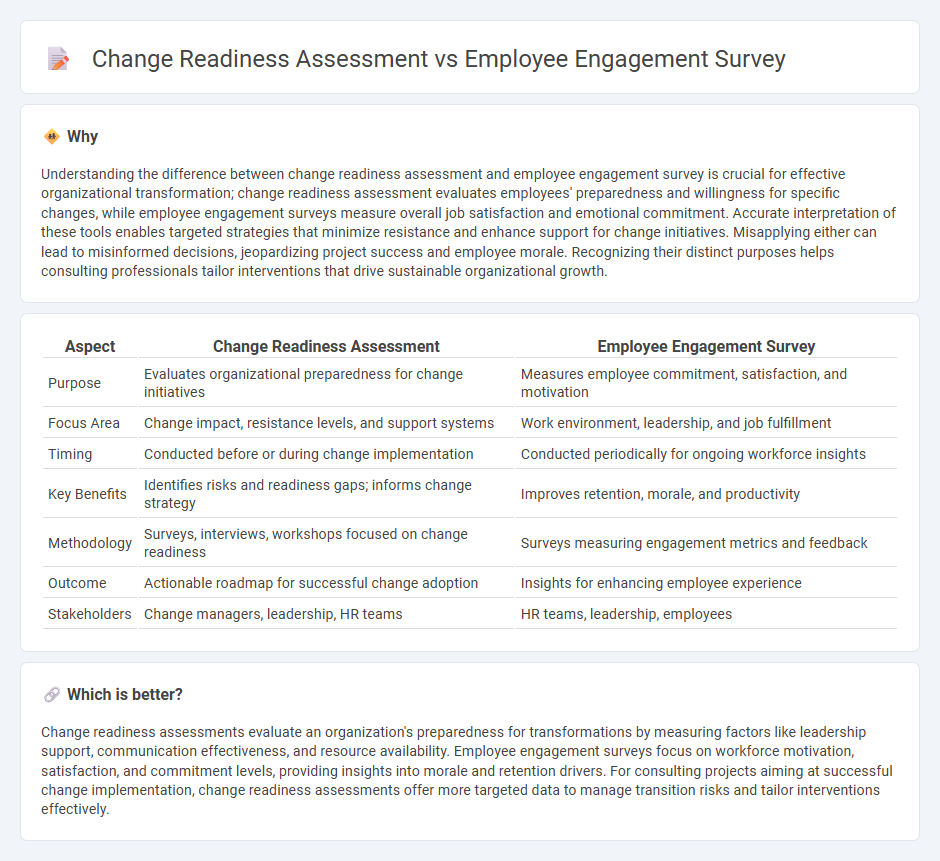
Change readiness assessment evaluates an organization's preparedness and capacity to implement change by measuring factors such as leadership support, communication effectiveness, and employee adaptability. Employee engagement surveys focus on understanding workforce motivation, satisfaction, and overall commitment to the company's goals and culture. Explore the differences and benefits of these tools to enhance your organization's transformation journey.
Why it is important
Understanding the difference between change readiness assessment and employee engagement survey is crucial for effective organizational transformation; change readiness assessment evaluates employees' preparedness and willingness for specific changes, while employee engagement surveys measure overall job satisfaction and emotional commitment. Accurate interpretation of these tools enables targeted strategies that minimize resistance and enhance support for change initiatives. Misapplying either can lead to misinformed decisions, jeopardizing project success and employee morale. Recognizing their distinct purposes helps consulting professionals tailor interventions that drive sustainable organizational growth.
Comparison Table
| Aspect | Change Readiness Assessment | Employee Engagement Survey |
|---|---|---|
| Purpose | Evaluates organizational preparedness for change initiatives | Measures employee commitment, satisfaction, and motivation |
| Focus Area | Change impact, resistance levels, and support systems | Work environment, leadership, and job fulfillment |
| Timing | Conducted before or during change implementation | Conducted periodically for ongoing workforce insights |
| Key Benefits | Identifies risks and readiness gaps; informs change strategy | Improves retention, morale, and productivity |
| Methodology | Surveys, interviews, workshops focused on change readiness | Surveys measuring engagement metrics and feedback |
| Outcome | Actionable roadmap for successful change adoption | Insights for enhancing employee experience |
| Stakeholders | Change managers, leadership, HR teams | HR teams, leadership, employees |
Which is better?
Change readiness assessments evaluate an organization's preparedness for transformations by measuring factors like leadership support, communication effectiveness, and resource availability. Employee engagement surveys focus on workforce motivation, satisfaction, and commitment levels, providing insights into morale and retention drivers. For consulting projects aiming at successful change implementation, change readiness assessments offer more targeted data to manage transition risks and tailor interventions effectively.
Connection
Change readiness assessment evaluates an organization's preparedness for transformation by measuring factors such as leadership support, resource availability, and employee attitudes. Employee engagement surveys provide critical insights into workforce morale, communication effectiveness, and resistance levels, which directly influence change adoption success. Together, these tools enable consultants to identify gaps in organizational readiness and tailor interventions that enhance employee commitment and resilience during change initiatives.
Key Terms
Feedback Collection
Employee engagement surveys primarily target the collection of feedback on workplace satisfaction, motivation, and overall morale, providing organizations with insights into employees' emotional connection and commitment. Change readiness assessments focus on gathering specific feedback related to employees' preparedness, attitudes, and concerns about upcoming organizational changes, enabling companies to tailor communication and support strategies effectively. Explore how strategically leveraging both tools can enhance your organization's feedback collection and change management processes.
Organizational Culture
Employee engagement surveys measure workforce satisfaction, motivation, and alignment with organizational values, providing insights into the current cultural climate. Change readiness assessments evaluate employees' willingness and capacity to adapt to upcoming transformations, reflecting the organization's resilience and adaptability. Explore deeper to understand how these tools shape and reinforce a thriving organizational culture.
Change Adoption
Employee engagement surveys measure workforce motivation, satisfaction, and commitment, providing insights into employee morale and organizational culture. Change readiness assessments evaluate employees' ability, willingness, and preparedness to adopt new processes or technologies, directly targeting change adoption success. Explore how combining these tools can optimize your organization's change management strategy for improved adoption outcomes.
Source and External Links
Employee Engagement Surveys: Ultimate Guide - SurveyMonkey - Employee engagement surveys measure employee satisfaction and identify pain points to improve company culture, with tools like the employee Net Promoter Score(r) to gauge overall engagement.
70 Employee Engagement Survey Questions [+ Free Template] - An employee engagement survey is a questionnaire to measure employee sentiment and engagement, often including eNPS, and is conducted periodically using full or pulse surveys to avoid fatigue while gaining insights.
Gallup's Q12 Employee Engagement Survey - Gallup's Q12 survey identifies core conditions for high-performing teams, linking high engagement to improved productivity, profitability, wellbeing, and lower absenteeism and turnover.
 dowidth.com
dowidth.com